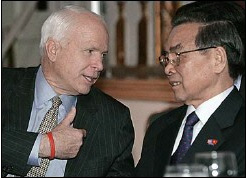 US
lawmakers welcome Vietnam leader with human rights bill
US
lawmakers welcome Vietnam leader with human rights bill
06-22-2005, 19h47
WASHINGTON (AFP)
http://news.yahoo.com/news?tmpl=story&u=/afp/20050622/wl_asia_afp/usvietnam_050622220216

Prime Minister of Vietnam Phan Van Khai(R) speaks with US Senator John
McCain (R-AZ) during a dinner at the Mayflower Hotel, 21 June 2005 in
Washington.
US critics of Vietnam's human rights record were
to
introduce a bill demanding greater political and religious freedom in the
communist country,
as its prime minister pursued a historic US tour.
Prime Minister Phan Van Khai met Congress leaders, a day after landmark
talks with President George W. Bush that took a new step in burying
animosity, 30 years after the end of the Vietnam War.
But
the introduction of "The Vietnam Human Rights Act" in the
House of Representatives was deliberately timed to coincide with Khai's
Washington visit.
The bill calls on the US administration to restrict non-humanitarian aid
to Vietnam unless specific human rights provisions are met.
The legislation also provides funding to counter Hanoi's jamming of Radio
Free Asia and financial support for groups promoting human rights and
democratic change in Vietnam.
The House passed similar legislation in 2001 and 2004, but it was stalled
in the Senate.
Vietnam hopes to join the World Trade Organization this year, but it must
still get Most Favored Nation status from the United States and the US
Congress, where many lawmakers have criticized Hanoi's rights record.
Some said they
have been disappointed
that so little attention to human rights was included in the Bush-Khai
summit -- despite a US decision last year to designate Vietnam a country
of concern over alleged violations of religious freedom.
Lawmakers reaffirmed concerns during a House hearing this week on human
rights in Vietnam.
"All over the world,
people from Vietnam
are prospering wherever there is freedom,"
said Representative Ed Royce. "But in communist-controlled Vietnam, there
is a lack of freedom and a lack of prosperity."
He said: "Progress on human rights in Vietnam has been stagnant -- if not
taking a step backwards."
Royce highlighted tight control of the media in Vietnam, where even news
of protests around Khai's US visit has been blacked out.
"Newspapers, television and radio stations remain under strict government
control. There is a crack-down on the Internet with young Vietnamese
serving long, long terms in prison because they attempt free speech," said
Royce, who is the author of legislation to increase Radio Free Asia
broadcasts to Vietnam.
"The human rights situation in Vietnam is abysmal," he said.
Condemnation of Vietnam's human rights record has been less evident during
official stops in Khai's visit,
which comes 10 years after Washington and Hanoi established diplomatic
relations.
The during the trip, which focuses largely on business ties, Khai also met
with Microsoft chairman Bill Gates, and is to ring the opening bell at the
New York Stock Exchange on Thursday.
"An outside observer looking at all of this activity would in all
likelihood ... deduce that Vietnam must also share the core values of the
United States that make our country great," said Representative Chris
Smith, author of the Vietnam Human Rights Act, at Monday's hearing.
But he said
"Vietnam needs to come out of the dark ages of repression, brutality and
abuse and embrace freedom, the rule of law, and respect for fundamental
human rights."
One of Vietnam's most outspoken Senate critics,
Republican Senator Sam Brownback, told AFP that he had hoped that the
White House would make human rights a bigger part of bilateral
discussions.
"I wrote to the White House asking them to raise the issue with the
Vietnamese officials that are here, so that we don't just do trade without
also addressing the human rights issues that are real," Brownback said.
Khai
has rejected claims of excessive human rights abuses.
But on Tuesday, as he met Bush at the White House, hundreds of
Vietnamese-Americans staged demonstrations outside.
Ends ./.
US lawmakers
welcome Vietnam leader with human rights bill
Wed Jun 22, 2:58 PM (Associated Free Press)
http://www.thsv.org/news_details.aspx?newsID=651
US
Congress critics of Vietnam's human rights record on Wednesday introduced
a bill demanding greater political and religious freedom in the communist
country as it prime minister pursued a historic tour.
Prime Minister Phan Van Khai was to meet Congress leaders on Wednesday, a
day after historic talks with President George W. Bush that took a new
step in burying animosity, 30 years after the end of the Vietnam War.
But the introduction of "The Vietnam Human Rights Act" in the House of
Representatives was deliberately timed to coincide with Khai's talks on
Capitol Hill.
The bill calls on the US administration to restrict non-humanitarian aid
to Vietnam unless specific human rights provisions are met.
The legislation also provides funding to counter Hanoi's jamming of Radio
Free Asia and financial support for groups promoting human rights and
democratic change in Vietnam.
The House passed similar legislation by large majorities in in 2001 and
2004. But it was stalled in the Senate.
Vietnam hopes to join the World Trade Organization this year, but it must
still get Most Favored Nation status from the United States and the US
Congress, where many lawmakers have criticized Hanoi's rights record.
Some said they have been disappointed that so little attention to human
rights was included in the Bush-Khai summit has been muted -- despite a US
decision last year to designate Vietnam a country of concern over alleged
violations of religious freedom.
Lamwakers reaffirmed concerns during a House hearing this week on human
rights in Vietnam.
"All over the world, people from Vietnam are prospering wherever there is
freedom," said Representative Ed Royce. "But in communist-controlled
Vietnam, there is a lack of freedom and a lack of prosperity."
He said: "Progress on human rights in Vietnam has been stagnant -- if not
taking a step backwards."
Royce highlighted tight control of the media in Vietnam, where even news
of protests around Khai's US visit has been blacked out.
"Newspapers, television and radio stations remain under strict government
control. There is a crack-down on the Internet with young Vietnamese
serving long, long terms in prison because they attempt free speech," said
Royce, who is the author of legislation to increase Radio Free Asia
broadcasts to Vietnam.
"The human rights situation in Vietnam is abysmal," he said.
Condemnation of Vietnam's human rights record has been less evident during
official stops in Khai's visit, which comes 10 years after Washington and
Hanoi established diplomatic relations.
The during the trip, which focuses largely on business ties, Khai also met
with Microsoft chairman Bill Gates, and was to ring the opening bell at
the New York Stock Exchange on Thursday.
"An outside observer looking at all of this activity would in all
likelihood ... deduce that Vietnam must also share the core values of the
United States that make our country great," said Representative Chris
Smith, author of the Vietnam Human Rights Act, at Monday's hearing.
But he said that is far from the case.
"Vietnam needs to come out of the dark ages of repression, brutality and
abuse and embrace freedom, the rule of law, and respect for fundamental
human rights," Smith said.
Khai has rejected claims of excessive human rights abuses. But on Tuesday,
as he met with US President George W. Bush at the White House, hundreds of
protesters outside loudly assailed his country's human rights records.
PM Signs Second Religious Freedom Pact
http://www.cbn.com/cbnnews/news/050622c.asp
By Paul
Strand
Washington Sr. Correspondent
CBN.com –
WASHINGTON - Vietnam's prime minister is visiting the U.S. this week. He
met with President Bush yesterday, and while relations between the two
countries may be improving, the situation for Christians in Vietnam
continues to decline.
This week's visit by
Vietnamese Prime Minister Phan Van Khai, the first by a Vietnamese Prime
Minister since the end of the war in 1975, comes as the U.S. and Vietnam
are forging closer economic ties.
But not everyone is
convinced that the Vietnamese government has changed its stripes.
Ann Buwalda, Director of the
Jubilee Campaign, said, “We are hopeful that President Bush will take a
strong stance and say, 'first you improve your human rights, and then we
can talk trade.'"
Hundreds of Vietnamese Christians are currently in prison for practicing
their faith. The vast majority are Montagnards, ethnic minorities from
Vietnam's northern and central highlands. But Mennonites, Roman Catholics,
and even Buddhists are also persecuted by Vietnam's communist regime.
Roger Severino of the Becket
Fund for Religious Liberty, said, “To be a Christian in Vietnam today is
to risk death, to risk arrest, to risk losing your household, losing your
livelihood, because of your religious beliefs.”
The U.S. and
Vietnam agreed
last month that Vietnam would begin to
allow greater religious freedom. But since the agreement, little has
changed. Only a handful of Christians have been released from prison, and
many are forced to renounce their faith.
One man's 80-year-old
mother, a Christian, was recently dragged from her home and beaten by
Vietnamese troops.
Kor Ksor, the founder of
Montagnard Foundation, Inc. said, “She worships God because she wants to
be saved, so that when she dies, she will be with the Lord.”
Following their meeting at
the White House, President Bush said that he and Prime Minister Khai had
signed yet another agreement that will make
it easier for people to worship freely in Vietnam.
They also discussed
Vietnam's possible admittance to the World Trade Organization. But
according to some lawmakers, before than can happen, Vietnam's attitude
towards human rights has to change
Rep. Chris Smith (R-NJ)
commented, “Vietnam needs to act like the strategic partner of the United
States we would like it to be, treating its citizens, even those who
disagree with government policies, with respect and dignity.”
The Prime
Minister's visit to Washington provided a backdrop for opponents of his
regime to share their stories. Several testified on Capitol Hill and
hundreds more attended rallies at the White House and Freedom Plaza. All
had the same message: freedom and religious liberty for Vietnam.